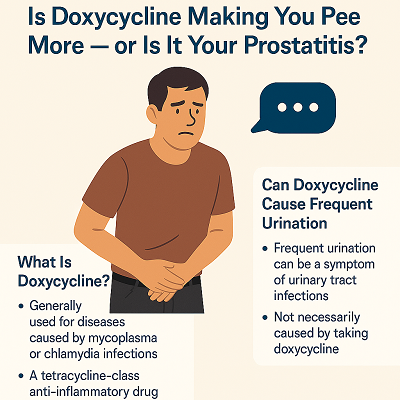Is Doxycycline Making You Pee More — or Is It Your Prostatitis?
Riley, a 34-year-old man, had been battling prostatitis for quite some time. After being prescribed doxycycline by his doctor, he noticed an increase in his urge to urinate just a few days into the treatment. He began to wonder: is this a side effect of the drug or a lingering symptom of the prostate condition itself? Feeling embarrassed to discuss it with family, the problem gradually affected his sleep and work, turning frequent urination into a frustrating, private burden.

What Is Doxycycline?
Doxycycline is generally used for diseases caused by mycoplasma or chlamydia infections. There are many causative factors for prostatitis, primarily due to bacterial infections. As a tetracycline-class anti-inflammatory drug, doxycycline has broad-spectrum bactericidal effects. Therefore, for patients with prostatitis, it can typically exert anti-inflammatory effects and improve clinical symptoms, which is why it is commonly used to treat prostatitis.
Can Doxycycline Cause Frequent Urination
Doxycycline is a broad-spectrum antibiotic with doxycycline hyclate as its active ingredient. Doxycycline hyclate is typically used to treat diseases caused by infections with Rickettsia, Mycoplasma, and Chlamydia. When doxycycline hyclate is used long-term, resistant Staphylococcus aureus, Gram-negative bacteria, and fungi may develop, leading to secondary infections such as urinary tract infections or gastrointestinal infections.
Frequent urination is a common symptom of urinary tract infections. Thus, taking doxycycline can indeed indirectly cause frequent urination by inducing urinary tract infections, particularly in cases of prolonged use (more than 14 days) or in immunocompromised patients.
However, frequent urination itself is actually one of the major symptoms of prostatitis. In patients with prostatitis, pathogenic bacteria invade and infect the urinary system. After these pathogens invade the prostate, they trigger local immune responses and inflammatory reactions, leading to prostate swelling and congestion.
This, in turn, compresses the urethra, increasing urinary frequency, which manifests as frequent urination. Simultaneously, the inflammation also irritates the bladder wall, enhancing its contraction frequency and further exacerbating the frequent urination. Additionally, the inflammation may cause blockage of the prostatic ducts, impairing the drainage of prostatic fluid.
When excessive prostatic fluid accumulates within the prostate, it exerts pressure on the urethra, also contributing to frequent urination. Therefore, frequent urination is not necessarily caused by taking doxycycline.
Treatment Methods for Frequent Urination
Treatment for Frequent Urination Caused by Doxycycline Side Effects
- Immediately discontinue or switch medications: Stop taking doxycycline and switch to antibiotics with lower nephrotoxicity (such as azithromycin or fosfomycin).
- Increase water intake: It is to accelerate drug excretion.
- Relieve frequent urination by addressing the cause: Use M-receptor antagonists (such as solifenacin or mirabegron to inhibit bladder overactivity) or employ traditional Chinese medicine as adjunctive therapy (for example, Longqing Tablets can be used to clear heat and relieve strangury, and Sanjin Tablets can help alleviate urinary tract irritation).
Treatment for Frequent Urination Caused by Prostatitis
1. For bacterial prostatitis, select antibiotic therapy (such as levofloxacin or azithromycin).
2. Use α-receptor blockers (such as tamsulosin or doxazosin) to relax the smooth muscles of the prostate and bladder neck.
3. Use non-steroidal anti-inflammatory drugs (such as celecoxib) to relieve pelvic pain or employ phytotherapeutic agents (such as Prostat Tablets) to reduce inflammatory reactions.
4. Implement physical and lifestyle interventions. Warm water sitz baths can help relieve pelvic floor muscle spasms. Additionally, avoiding irritants such as alcohol and spicy foods, reducing prolonged sitting, and engaging in pelvic floor muscle training appropriately can also be beneficial.
5. For patients with Chronic Non-bacterial Prostatitis, where standard antibiotic therapy often proves ineffective, natural and holistic approaches have shown promising results. One such option is the Diuretic and Anti-inflammatory Pill, a traditional herbal remedy formulated to promote blood circulation, relieve pelvic congestion, and reduce inflammation in the prostate and surrounding tissues.
Unlike antibiotics, which may not target the root cause in non-bacterial cases, this herbal formula works by restoring internal balance and improving urinary and reproductive system function. Many patients report significant relief from symptoms such as pelvic pain, frequent urination, and discomfort after prolonged use. It offers a gentle yet effective alternative for those seeking long-term symptom control without the side effects of conventional medications.
If frequent urination persists despite treatment, it is essential to seek further evaluation to identify the underlying cause and prevent misdiagnosis. Maintaining good hygiene, avoiding prolonged sitting or holding in urine, and following medical advice can go a long way in managing symptoms and improving quality of life.



